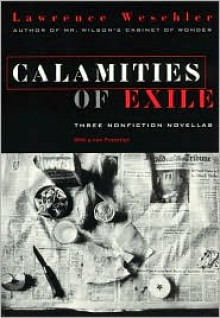The three narratives joined together in New Yorker staff writer Lawrence Weschler's latest volume were conceived from the start as a sort of triptych: three tales, that is, about basically decent expatriates (the first an Iraqi, the second a Czech, the third an Afrikaner), each of whom tries to...
show more
The three narratives joined together in New Yorker staff writer Lawrence Weschler's latest volume were conceived from the start as a sort of triptych: three tales, that is, about basically decent expatriates (the first an Iraqi, the second a Czech, the third an Afrikaner), each of whom tries to do the right thing with regard to the totalitarian regime holding sway over his homeland--the thing the reader, too, might have done, if only he were much more courageous than he is--only to end up thoroughly wracked and bollixed.Kanan Makiya, for example, hiding behind the pseudonym "Samir al-Khalil," pens a savage indictment of Saddam Hussein's reign of terror in Iraq, and more specifically of the Iraqi intelligentsia and artists who collude in that reign--artists, that is, like his own father, the dictator's favorite architect.Jan Kavan, a leading student activist in the Prague Spring of 1968 (motivated in part by a desire to avenge the fate of his father brought down in the Stalinist show trials of the 1950s), spends the next twenty years of exile operating the Czech underground opposition's principal smuggling conduit. Returning a conquering hero after the Velvet Revolution of 1989, he gets elected to Parliament, only to suddenly find himself being denounced as a longtime collaborator of the Communist secret police.And Breyten Breytenbach, undoubtedly the foremost modern poet in the Afrikaans language, even from his base in Parisian exile, comes to find mere literature an inadequate response to the scandal of apartheid. Instead he joins a radical underground conspiracy and embarks on a foolhardy return mission to his homeland, traveling incognito, all to no avail: he is captured, imprisoned, utterly broken and almost completely destroyed, barely recovering himself at the last moment.Taken together, these gripping narratives afford a sort of double CAT scan into the natures of both modern totalitarianism and timeless exile."Lawrence Weschler is a
show less

